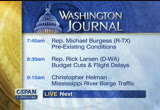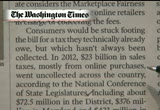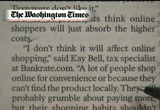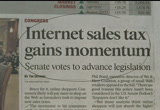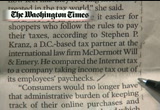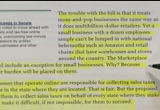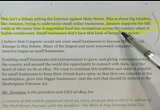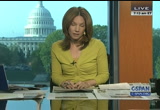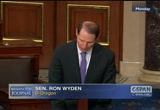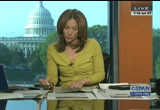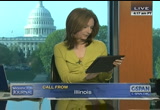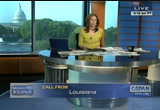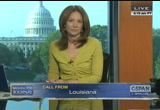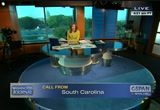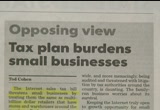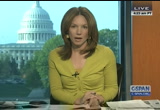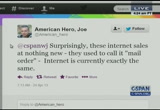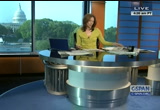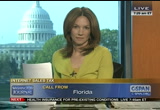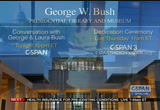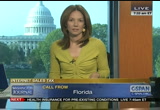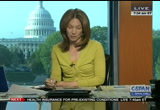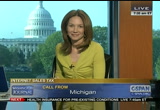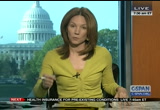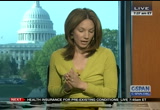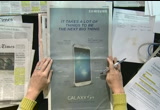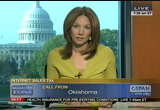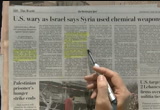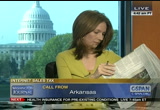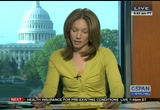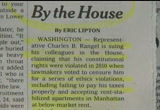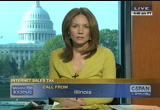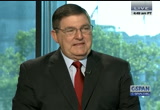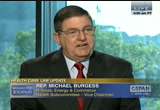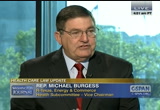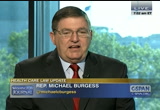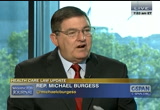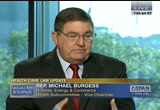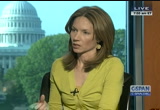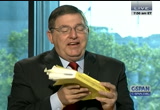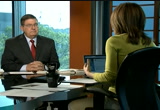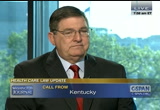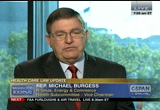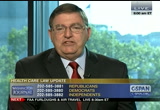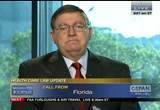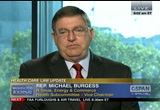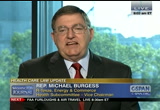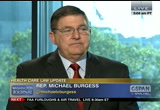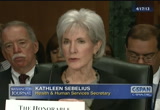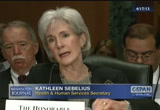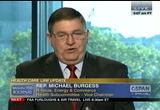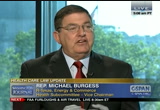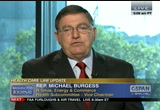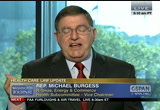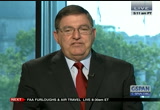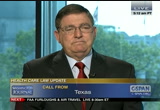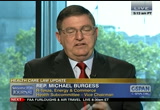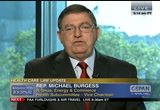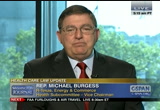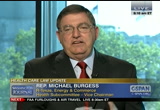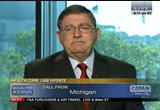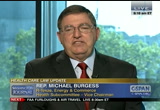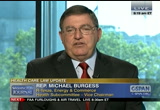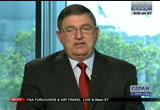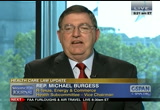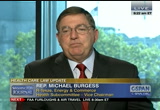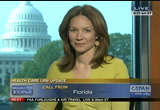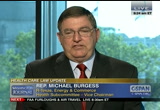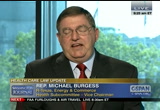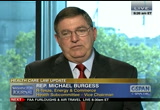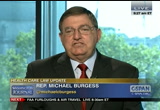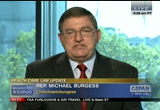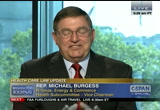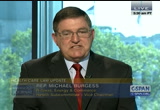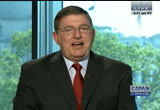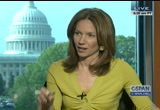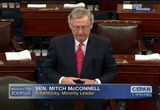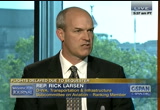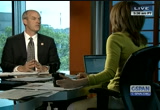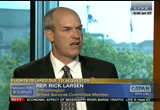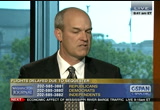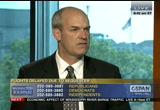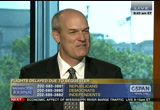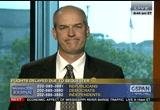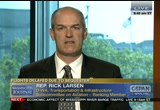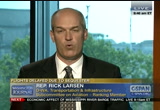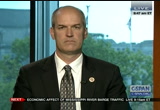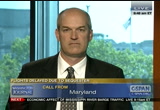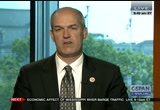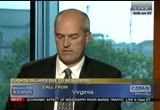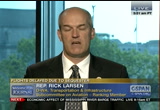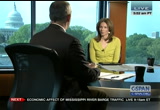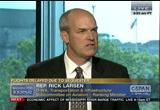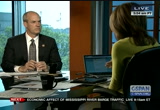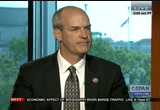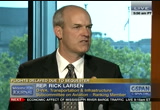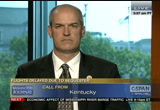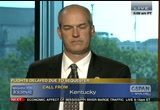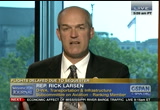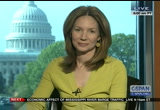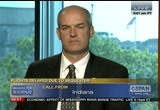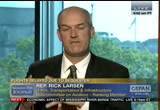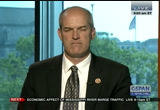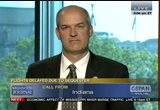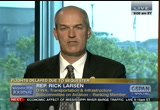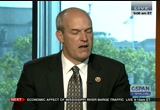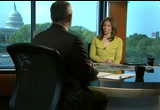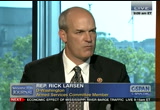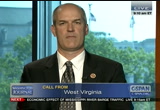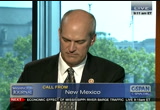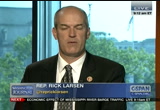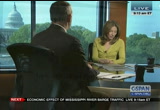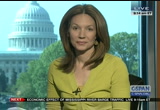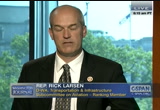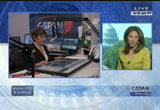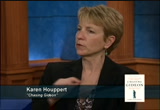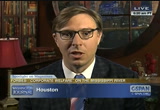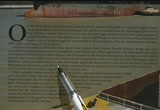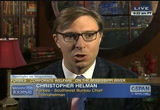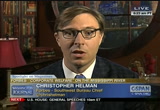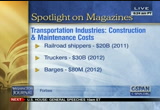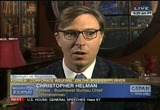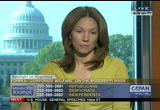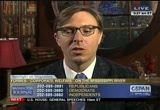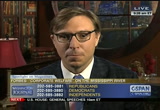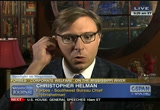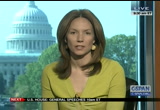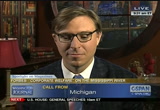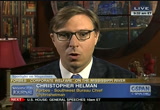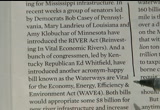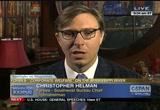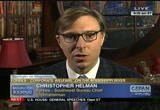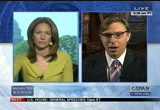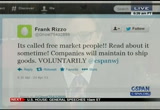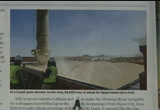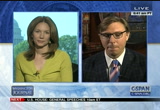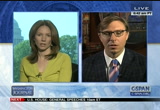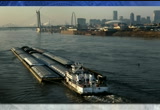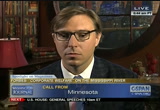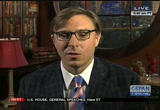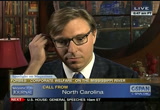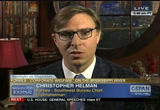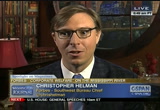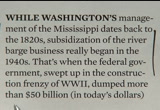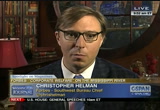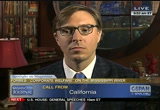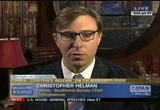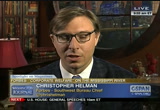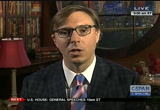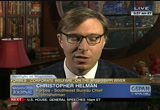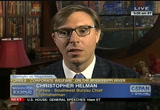tv Washington Journal CSPAN April 24, 2013 7:00am-10:00am EDT
7:00 am
>> ♪ the morning and welcome to the washington journal on this wednesday, april 24, 2013. here's what's happening on capitol hill. the house will take up legislation to a high risk patients try to get insurance under the new health care law. it will divert funds from another program to do so. we will talk with the bill's sponsor, coming up. if in the senate, majority leader harry reid said democrats will try to replace the sequester for about five months. the savings from drawing down the wars in afghanistan and iraq. meanwhile, congress is working toward putting an internet sales tax on the books. we want to get your reaction
7:01 am
7:03 am
we want to hear from you this morning. bill your shopping habits change? what you think about a national internet sales tax? john supports the idea in tennessee. caller: i kind of support the idea, but at the same time there is a lot more that we have to be looking at with regard to how this is going to affect us in the long run, because the i mean, is really -- the internet is the printing press. it is something that is changing the world in many ways for the better. at the same time it poses a lot of risks to us. with regard to the internet sales tax, taxing anything right now in this economy is a terrible idea, but at the same time we have big companies like fromn that they take away
7:04 am
the ability of people to start little businesses globally. with that said, i want to ask you guys a quick question. if you guys were ever going to think about covering perhaps the legislation that's about the past. host: we did on the weekend on saturday. we talked about the cybersecurity legislation. we will continue to cover it as it makes its way through congress. caller: i appreciate you taking the time. i hope you guys will spend as much time on that as we have spent on the bombings, because this whole concern that i have is we don't need to live in fear. unfortunately, that seems to be what we have been doing. we have made this the modus for america.i
7:05 am
host: we also have a program on c-span called "communicators" that covers this issue as well. ,o to our website, c-span.org and you can find that series and "lso find ""washington journal. we have updated our web page. if you go to the top, you can find the link for the washington journal. our producer is doing it for you prevent will bring it to our updated web page for the washington journal, or you can see what we have covered recently. let me go back to the internet we want tobecause get your thoughts on that this morning. if you support this idea, 3880. 3881. oppose, rom this "washington times"
7:06 am
7:07 am
being a in a small business before. host: we are listening. caller: there are a lot of individual to individual sales on the internet. how does an individual person like on ebay or other sites, how will they pay sales tax? oft: john donoghue, the ceo ebay, had an opinion piece in the wall street journal yesterday. he wrote about that issue. he said the trouble with the bill is that it treats mom-and- pop businesses the same way as it does multibillion-dollar retailers.
7:08 am
ebay want that exemption to be even higher, to bring extra $10 million. caller: i did not realize they had that in there, but i don't think it needs to be $10 million. there's a lot of small people, just individual people that it's going to be really hard. you have to keep up with tax numbers on a monthly basis. if there's an exemption, it might be a good idea. host: a little bit more from the piece in the wall street journal --
7:09 am
rick in spokane, washington, supports the idea. caller: thanks for taking my call. host: go ahead. anler: i am supporting internet sales tax. the federal government needs. host: but this would not be for the federal government. this would be sales taxes that the states collect. caller: ok, well they need revenue, too. i am supporting it. there was so much money in this country that the government should be flush. the government wants everything
7:10 am
to be for the rich. that's why we are having governments going broke or not bringing in enough revenue. ast: this is not necessarily republicans versus democratic idea. it was voted on 74-20 to go ahead. those opposing include a democrat from oregon, senator wyden. caller: usually takes a liberal position during nobody will be hitting on the same side every time. host: you touched on this issue , the crux of the bill, and it is what did durbin had to say when he was on the floor on monday talking about it. [video clip] >> the white house has announced the president supports this bill to give states the authority to collect sales tax from internet retailers. the white house spokesman said the senate bill would level the
7:11 am
playing field for small business and brick-and-mortar retailers undercut by on-line companies. the governors and mayors have overwhelmingly supported this bill. they told the white house. the bill was house the states are losing out on revenue that could go to education, law enforcement, and infrastructure, investment, and health care. we have a wide array of businesses supporting this. retailers large and small supporting it. labor unions supporting as well. business and labor have come together. they believe this is only a matter of fairness. host: senator dick durbin on the floor on monday talking about why he has sponsored this bill and by senators should support it. stan is in new york. you oppose the idea. caller: i live in new york state and we get slammed with taxes every second of the day. they have driven so many businesses out of this state it is incredible. for everything they take from us and what i see and i don't
7:12 am
see we get for it, it's incredible. the last thing we need to do is give the state or federal government any more money. it is ridiculous. i have to ask c-span for one thing. please, get a hold of glenn beck and talk to him about this saudi national. get these sixwho have seen documented evidence that this guy is involved with the boston bombings. host: why did you say that? where have you seen that? caller: our government has an yvette file that they started at on the first saudi national they had in the hospital. a classified him in that document as a terrorist who was directly related to the boston bombings. the next day they pulled the classification. that was after a senior saudi ambassador went to the white house for an unannounced meeting where mr. obama supposedly showed up. our two can ask rt
7:13 am
members of congress about that. here's the washington post this morning on this story,. homeland security secretary janet napolitano was testifying yesterday on capitol hill before the senate judiciary committee. here is the headline in the washington post. in that article it says -- so that was part of the hearing yesterday. if your interested, go to c- span.org and watch our coverage of the hearing.
7:14 am
in 2010 the obama administration halted work on a virtual since prod -- virtual fence project. janet napolitano says the legislation that was unveiled last week would require all u.s. passports to be electronically readable, potentially avoiding problems they saw when one of the bombing suspects left to go to russia and the fbi was not informed about him leaving the country. that's the new immigration bill, that it would solve that type of problem from occurring again. back to our topic for all of you. the internet sales tax. do you support or oppose it. we talked about the democrat
7:15 am
from oregon who opposes the idea. here is what he had to say on the senate floor. [video clip] thatis is legislation enables one state to impose the enforcement of its laws on 39 other states and the territories without the approval of such states and territories. let me repeat that. it is . . it can be forced on these other states against their will and businesses can be audited by a myriad of out of state tax collectors and would be forced to defend themselves. coercion. without an effort to at least
7:16 am
promotes some elements of a voluntaryness in this, a vote for the marketplace fairness act is a vote to subject a senator's home state internet companies to the whim of tax collectors can state courts around the country. host: if you go to the senators web page, this is what you'll find. a banner across the front of it -- the newspapers yesterday, here's the new york times on this legislation --
7:17 am
shirley opposes the idea in texas. caller: i do. the internet is international. all that is going to do is cause people to buy internationally. it will make american companies go offshore even more than they do now. so that people buy from them offshore. i think it's a terrible idea host:. all right. susan in illinois opposes as well. what do you think? you are on the air. caller: i am opposed to it because i think our government is spending too much money on all these other little countries like sudan and colombia and giving them money. we are spending the money we
7:18 am
don't even have. we are borrowing money from china and other places to raise our national deficit. we need to stop doing this. think taxing the internet will work. host: evelyn new orleans also opposes the idea. caller: i oppose it because i feel we are overtaxed. i don't feel the government should be able to collect money off the internet, because those fees will be passed down to the consumers. i really believe everything that we pay from cable bills and all of our bills, we are taxed on everything. incomeall or medium families get through paying taxes, they have nothing to live on, no money left. i don't even believe in state
7:19 am
income taxes, because the poor are the ones suffering. host: how much do you shop online? caller: i shopped on-line very seldom, but i have shopped on- line. how they're going to control that and collect from the state. host: if you do most of your shopping in local stores and there is a sales tax, you are paying more than maybe if you had bought the product online. caller: but we are still paying taxes. theave too many taxes to consumers already. i don't think we need additional taxes at this time. with all the tax is going on in the different states, we are taxed on everything. ll of our bills, we pay3 4 ferent tack -- pay 3 or
7:20 am
different taxes. and you have nothing to live off of. host: this from our facebook page. by the way, if you want to post your comments on facebook, you can do so. or send us your comments to twitter.com. or you can e-mail us. on facebook -- those are some comments on our facebook page this morning. jim in south carolina opposes the idea. caller: i was listening to wellstone about his viewpoint, the senator. host: senator wyden? caller: yes.
7:21 am
he says you should not force companies to pay taxes, yet he was for the obama health care bill that forces people to pay taxes. i cannot recall everything he said, but it spoke of hypocrisy. i don't know. i did you are for it or against it, but you should be the same viewpoint and carry on the same kind of methodology. it should bethat paid because there should be an equal platform between internet businesses and brick-and-mortar businesses. there should not be the huge disadvantage. if people want all these government benefit programs and they cried about paying taxes, why should they fret? there should be no democrats saying they don't want the tax. host: this is the editorial section of usa today --
7:22 am
7:23 am
7:24 am
people go into the stores and look at something and then order it online where you don't have to pay taxes. that hurts companies. equalelieve it should be for everybody. i hear all these people calling talking about taxes. if you want services, you have to pay taxes. i don't understand people. if they don't like paying taxes, don't pay them. go to jail or whatever. i don't believe they're getting information right. to foxsten too much news, i reckon. everybody wants a free ride. me and my wife work every day and pay taxes and we don't ask for anything extra. --t: on twitter to the boston bombings, the boston globe reporting --
7:25 am
if you're interested in watching that. and it in the times picayune -- and in the dallas morning news -- that their lead story in that texas newspaper this morning. the detroit free press -- oft's a picture of the wife boston bombings suspect tamerlan tsarnaev. the washington post this morning on the ricin case that in many of the newspapers this morning. the mississippi man that was
7:26 am
accused in the case has been released. authorities dropped charges tuesday against that man. a u.s. senator and a county .udge that the front page of the washington post this morning. in congressional moves, here's the front page of a newspaper in montana. the washington post reported this morning the senator said that he will continue to push for comprehensive rewrites of the federal tax code while he is still in the senate for his remaining time. ofator max baucus, democrat montana set to retire when his term is up. so that's in the newspapers this
7:27 am
morning. we will bring you more news as we continue to get your thoughts this morning on the internet sales tax. arizonad prescott, opposes the idea. caller: yes, i oppose it. there's a lot more to it. if it's any more taxes being paid out instead of back to the people, they will have to tell more about it. things very few generated in all that, even though everybody connected into it. anybody wants to look into that, i absolutely do oppose it. not only that, but there's so much money that has already been taken away from us. that will just- continue that. that's all i have to say. in doylestown,
7:28 am
pennsylvania, opposes the idea. caller: yes, because it will create a nightmare as part as small-business trying to collect the tax. large it's a promotion by business as far as collecting the tax. i don't think it's that big a factor as far shoppers are concerned. host: so you do oppose? caller: absolutely. host: another tom, in fort lauderdale, florida. also in support. caller: good morning. would it be possible to make our tax system more complex? look at all the taxes we have. i could be sitting in the office of my home one thing to do the
7:29 am
right thing, fill out my tax form, and be made to feel like a wrong.l for doing trompit when is somebody going to say enough is enough? let's go to a value added tax. let's go to some tax that takes the onus off of the honest hard- that takesizen -- the burden away from all this craziness. if you had a value added tax, you would not have to ask the question should there be a sales tax? it's already there. then the playing field would be level. what is it about our government that it has to be complex? host: all right. in other news this morning, president obama slated to head
7:30 am
to texas on thursday. here's the associated press this morning -- we will be covering that dedication of the library here on c-span tonight at 10:00 p.m. eastern time at. excuse me, wen -- have an interview with george and laura bush airing tonight at 10:00 p.m. on c-span. the dedication of the library is on thursday, when president obama will be attending.
7:31 am
that's live 11:00 a.m. eastern time on c-span3. a little bit from that interview that we had with the former president's. -- president. jonathan martin -- martin wrote -- [video clip] >> the new documentary and on dick cheney, what has your relationship been like since you left the white house? >> it has been cordial, but he lives in washington and we live in dallas. one of the saddest things about departing washington is that you miss your pals. there foreople were all eight years and i became good friends with them. as well as vice president cheney.
7:32 am
i don't see him much. i don't see many of the people i worked with much and it's kind of sad. it's great to be in texas, however. host: the full interview airs tonight at 10:00 p.m. and will air again thursday, april 25 at 6:20 a.m. on c-span and c-span radio. the bush library dedication will be live thursday at 11:00 a.m. on c-span3 and c-span radio. in the interview conducted, the president and laura bush discussed the design and construction of the library, decisions made during their eight years in the white house, and upcoming projects for the bush institute. on the presidential library, it is the 15th presidential library built on the campus of southern methodist university in dallas, tx. had anashington times" interview with the former president as well.
7:33 am
gasoline in st. augustine, florida, opposes the idea of an internet sales tax. itler: the reason i oppose is in many instances when you buy things on line and at the shipping and handling, you are actually paying more than if you went to a store and just paid sales tax. that, theer side of shipping and handling creates jobs for the people who package and mail and deliver. so i don't think you can have it both ways. 6% sales tax and then shipping and handling, there would be no advantage in many instances to shopping online. host: kathleen, do you shop online? caller: very rarely. i usually do comparison shopping. in most instances, by that time i am shipping and handling, it's cheaper to go to the local store. host: david in quincy, michigan,
7:34 am
opposes the idea. caller: good morning. that was my point as well, the shipping and handling. that stance on to the cost of buying and from amazon and adding sales tax on top of that would be a burden. do may be a place like amazon or just about of the country, and i'm not sure how that would apply to the states that don't have sales tax. would they be forced to collect sales tax where they now have none? host: the new york times story yesterday talked about the states. one of them being oregon. wyden is opposed to the idea. it says oregon, montana, new hampshire, and delaware would have to build a collection apparatus from scratch. caller: i think florida and texas t don't andoo much sales tax either. host: i think it income-tax they
7:35 am
don't have. caller: i'm sorry. anyway. like that places don't have sales tax. host: how much shopping you do online? caller: quite a bit, probably a four or five times a month. host: where do you go? caller: i buy mostly from amazon and its on ebay shopping. the: what you think about prime membership you can get the amazon where you pay a yearly fee and everything gets shipped in two days? caller: i have that account. host: what about the economics of that? caller: i think it does encourage me to buy online because i don't pay any tax or shipping. the prime account costs $80 per year. i think you can do movies and
7:36 am
stuff from amazon from that also. i kind of like it. i feel it's pretty good. host: all right. on twitter -- hopes we're getting your thoughts on a national internet sales tax as it makes its way through congress. the headline in the new york times yesterday -- the vote was 74-20, approving the move. we will keep taking your phone calls. we want to hear whether or not you support or oppose. here is the front page of usa today with their story about what many of you might have
7:37 am
7:38 am
continuing with technology, the front page of the wall street journal, apple and snaps its growth streak. the company posted its first profit drop in a decade and signaled that new products may not arrive as quickly as investors had hoped. the company sold 10 million more i phones and ipads in the latest quarter than it did a year ago. that underscores the resilience of its franchise amid competition from samsung . a full-page ad from samsung in the usa today newspaper. also in the washington post yesterday. if they continue on inside "usa 8 full page ads by
7:39 am
samsung. dan in tulsa, oklahoma? go ahead. isler: on this sales tax, it a pretty good idea. what would they use the money for? would it be for good cause? host: the states would be collecting the sales tax. senator durbin said it could be used for education and other areas to pay off debts, etc. caller: we spend more than anybody else on education, don't we? host: so and you don't like the idea? if somebody invents a way to make a profit and develop a better way to make a profit, then why should you penalize them?
7:40 am
host: all right. frank in new jersey, opposing. caller: the internet sales tax is just another way of putting a burden on middle-class. it seems a logical to do that. it's one of the only outlets for people to save money right now. illogical. they are making sure they don't have to tax the rich, putting a burden on the middle class. that's why you are seeing so many republicans jumping on board for this. it is not going to be good for middle america. host: president obama continued with what is being called in washington a charm offensive, meeting with 20 female senators last night.
7:41 am
"politico." that was at the white house yesterday. and in the news, syria. that's the headline in the washington post and many other newspapers this morning. with they spoke israeli prime minister by phone tuesday morning and he said netanyahu was not in a position to confirm the assessment by israel's military.
7:42 am
that's regarding whether chemical weapons were used. the support the idea of a national sales tax, robert tuck? of ar: it is a collection tax. right now you are liable for the tax as it is. i'm on the library board. when we are audited, we have to keep track of the items we have bought through the internet and then we have to pay those, because we are automatically tax.onsible for the atta with thet do that million-dollar exemption, so you have a flea market or a bootth. if you choose to do your business over the internet, or you choose to have a flea market
7:43 am
on the side of the road, you have to weigh the cost of doing that business. there are wrongly describing it when they say it is an internet tax. it is collecting a tax that is already owed and being collected by brick-and-mortar cos. host: all right. the front page of the washington times -- that the house and republicans report on that issue. speaking of reports, here's the washington post this morning with a new report out on wealth and inequality.
7:44 am
7:45 am
in the state of rhode island, the headline from the new york times -- another vote expected today in that state. the washington post, the economy and business section -- putting out some new rules on that. not to chicago, supporting the .dea of an internet sales tax caller: good morning, greta. i have been diagnosed with four terminal diseases, so it's difficult for me to speak. host: take your time. caller: this is only my second
7:46 am
time calling. i was swept libby on about a month and a half ago. i support the taxes on the i alsoet because -- support the 1% sales tax on all wall street transactions, derivatives, hedge funds, etc. since i have been diagnosed with terminal diseases, the government only gives me $710 and $16 in food stamps. people always complain about welfare. that's all i'm getting. imagine you were living like that and you are dying? i have no money to buy anything on the internet anyway. have to and tax the rich. [indiscernible]
7:47 am
brothers are rich, but they like to pay their taxes. they are good people. there are good people who are rich to like to pay their taxes. i love c-span. thank you very much. host: sorry to hear about your condition. thanks for calling. next we will turn our discussion to the affordable care act with texas congressman michael burgess, including his legislation dealing with pre- existing conditions. the house will vote on that today. then later the impact of the sequester on flight delays. congressman rick larsen, democrat of washington state, will be our guest. >> ♪ [video clip] at herhave to look vision as a partner. there were several first ladies who consider themselves to be partners with their husbands.
7:48 am
not that they were trying to tell them what to do, but to help advise them, help take care of them, whether mentally or physically or politically. and i think she was a very significant influence on her husband. >> she is a tragic figure. >> yes. >> part of the tragedy is the partnership, which i believe it did help contribute to his becoming president, in many ways destroyed by the war. but our conversation about mary todd lincoln is now available on our website, c-span.org. watch monday for our next program on first lady eliza johnson. [video clip] two cars my kids, if pull up and one car has a stranger and the other car has dick cheney, you get in the
7:49 am
car with a stranger. >> i think about all the money spent on health care and against health care, we could have had health care. >> it's amazing being in washington with all these amazing buildings and history and here we are at the hilton. >> kind of hard to be funny with the president looking at you and yet somehow day after day joe biden manages to do it. >> this weekend, the white house correspondents' dinner. president obama and conan o'brien headlined the event before an audience of journalists, celebrities, and the white house press corps. for our coverage starts with the red carpet arrivals. on c-t 6:15 on saturday span. >> "washington journal" continues. host: congressman michael burgess is vice chair of the energy and commerce subcommittee. the house will vote on this today, your legislation dealing
7:50 am
with pre-existing conditions. guest: the problem occurred when the administration said late january early february that no more people could enroll in the federal pre-existing condition program that was set up as a consequence of the affordable care act. if that created a problem. we heard from some people in a hearing early this month about the problem that it created. we sent a letter to the president, said there's money available in the affordable care act and other places, so why not fix this and not make it a big deal? he refused to answer the question. looking in the affordable care act, there's money in the prevention fund that they are using now not for prevention but to set up to help exchanges. why not just use this money to continue the pre-existed program for the additional eight months until the elysian fields are created where we all lie down in the obamacare of the future? why not take care of these people with the money that already in the bill? we got no response, so we
7:51 am
created a bill to do tthat. the obama administration says they will veto if it comes to them. it's important for the house to have the debate today and we will see where the votes are. said kathleen sebelius that she has had to resort to using the prevention fund because congressional republicans have refused to provide the administration? with financing needed to propel the law into place. guest: guilty as charged. if someone wants to accuse me of doing everything i can to stop this terrible affordable care act in its tracks, absolutely. what happened wasn't the money available for the implementation of the affordable care act was reduced in the continuing resolution that was passed in march. i'm sure the department of health and human services is feeling the effects of that as well as the sequester. but that's their job. they are supposed to plan for
7:52 am
these things. they are supposed to manage with the money they have, not rob peter to pay paul and take money from other people. i cannot emphasize enough, the hearing we had on this in early april, a woman had been diagnosed with lymphoma, a pretty serious disease, treatable but expensive. she exhausted -- she lost a job and exhausted her cobra coverage and she was told you have to be uninsured six months in order to get into the federal pre-existed program. she's counting her dollars, max out your credit cards to make sure she can continue our treatment so her disease does not get worse, but she's counting the days until she can be taken into the federal program. then she gets there and they say, sorry, we are no longer enrolling people, so you are out of luck. that's a pretty harsh judgments rendered to this person. at the same time you have dollars within the affordable care act being used to fund all manner of crazy things under the
7:53 am
prevention fund. why not take some of these dollars and continue enrolling people in the existing side for an additional eight months? host: under the pre-existed program, what happens in 2014? , had: under current law they not had this problem that exists today, in 2014, people would simply able to buy in the exchanges. it would receive a subsidy from the federal government to buy into the exchanges and insurance companies would function under guaranteed issue, where no one could be denied a policy. soldffordable care act was to the american people almost as a bill of goods, because over and over again we kept hearing about there are maybe 15 million people with pre-existing conditions out there that are wandering the countryside, unable to find insurance coverage. so the law passed and the setup the federal pre-existing system, which was an error.
7:54 am
it should've been a state- directed agency. nevertheless they set up a new federal agency. this kinda a hundred thousand people after three years. it was not 15 million people. it was a problem that affected people in a small group and individual market. someone in a large group market, they have open enrollment. if you have a pre-existing condition, it may be a modest problem for them. people in a small group market, individual market, those are the folks who have trouble. why not focus on fixing that problem? this was three years ago. why not focus on fixing that problem rather than taking over the entirety of health care in the whole country? but the administration three years ago was dead set on doing this. democrats were in charge and they had big majorities for and they were set on doing this and dedicated. host: in 2014 these people are taking care of? the problem does not exist once we get to know 2014? guest: if everything goes as
7:55 am
planned, but you are seeing some fractures. some of the harshest critics in the past couple weeks have been democratic senators who say that this law is a train wreck, a disaster waiting to happen. there's a question as to whether or not everything will work as plant come october 1 of this tor when people are supposed build a to go on 9 and signed up for their obamacare. you are correct. if everything works as planned, by january 1 of 2014, this is a problem that would be solved. however, what happens to the woman we saw in our hearing, over the next eight months? if she cannot keep treatment going, the lymphoma could progress to the point where it might not be recoverable. host: legislation the house will vote on this afternoon, does it do anything to the 2014 date? guest: it does not affect that date.
7:56 am
the criticism here getting from the right is that is still leave the affordable care act out there and it's a problem. i will stipulate that they are correct, it is a problem. on the other hand, we are preventing -- using the irevention fund to prevent -- don't think they're going to be ready. they have had three years. host: a democratic congresswoman said democrats want to keep this pre-existing condition program in place but they want to paige ford by rolling back some oil and gas company tax breaks. they have spent more than a year trying to undo the affordable care act and now they are trying to chop it us, she says. guest: guilty as charged. this is like saying the dog ate my homework, so i turned in the rough draft. the senate passed this thing out on christmas eve had a big snowstorm. the house have entirely
7:57 am
different bill that the house had passed, but they never. -- but they never went ahead. my prediction is january 1, people will find out how deeply flawed this was. the hhscording to ,ebsite, about the prevention would you take money from that to pay for? existing? for a pre- are you concerned about taking money away from a fund that could be used if there was some sort of health scare out there? that money could be used to help prevent it from spreading. guest: this is a duplicative. the cdc would continue to exist. the cdc has other sources of
7:58 am
funding. the department of health and human services is replete with programs that are duplicative and wasteful. what the prevention fund is being used for is a lobby hawk to lobby against fast-food franchises been built, to lobby for taxes on sugary drinks. worthwhileay be piece is a public policy, but the prevention fund should not be paying for their lobbying. host: we will get to phone calls. in kentucky, a democrat. caller: hello. you are asking why don't we take care of that one pre-existing condition? let me tell you this. the only solutions you came up with was the free-market. theed to be a commoners in emergency room. i lost my insurance before i lost my job and then spent 3 1/2 years homeless after becoming
7:59 am
ill. i've been on disability for the last 12 years and live off the state rather than paying taxes and saving lives. the solution you came up with was a problem. the free-market came up with the idea of pre-existing conditions. the free market came up with these lifetime caps. i was homeless and was in and du caller: the best thing would be for-profit hese health systems. host: congressman? the affordable care act will not do that. preexisting programs, programs, risk pools and programs that preexisting conditions exist in 35 states prior to the the affordable care act. the smarter thing would be to had state states that
8:00 am
programs in place and the 15 tates that did not to provide them a framework on which they can build their programs in wished.ates if they but the problem was that the $5 building a newto federal program for preexisting people ns and hire new and computers and $5 billion it in three ugh 100,000 at the end of the program. that is hardly a wise expenditure of money. could have been better spent as grants to states doing their own reinsurance or risk pools, providing a framework for other states that didn't provide that so they could either incorporate populations into their medicaid population or perhaps cover them under the same employees are covered. there were ways to deal with his because although the stories are compelling, it was a inite population affected and
8:01 am
it didn't require complete destruction of the healthcare that.m to do host: kathleen, jacksonville, florida, independent caller. hi.er: a couple of quick comments. totally echo the previous gentleman's call. there are some things that iould never be for profit and believe that healthcare is one of them. prisons, i know that is not what talking about, but the -- prison industrial complex is horrendous. condition, the bla block grants don't work. to privatize g everything. i'm in florida and rick scott money down the medicare and said he would take it. our legislature is voting it -- i'm sorry -- the to ral government is going pay i believe it is 100% for the or two and then 90%.
8:02 am
come up with that 10%? what you are referring to is the expansion of medicaid care act.affordable the supreme court provided tates an escape valve if they did not want to participate in the federal expansion of states. in their my home state of texas is one the elected not to undergo expansion. that is separate from the preexisting condition issue. the he difficulty with medicaid expansion is the issue of the cost. a few short weeks this town is going to be absolutely with the side down debate over what is called death limit extension or expansion. you that will not be an easy discussion. tore are these dollars going come from for the medicaid expansion? when he overnor scott,
8:03 am
was looking at this critically, i think he was exactly right. right governor perry is to say the federal government is emonstrably and irresponsible fiscal partner and i am not sure i want to be involved. expansion is a separate issue from the preexisting condition pool which affordable care act and different from the state risk pools in existence and it a separate issue from the state exchanges, which a state choice if the state says we are not going to work with the federal government to set up exchange, the is federal government is required by law to set up the exchange and 26 states will have by the s entirely run federal government. if we want to get into why did the work not take on of helping the federal government with the roll out of act is rdable care because the states were never consulted at the front end. invited to the
8:04 am
secret meetings of the white house where the special about their ked wish list for what they wanted in the healthcare legislation. a governor among them. hen the administration made hide the ball and all the rules hat were to affect how the administrations were to be run were not published and said you have a couple of weeks to decide you are in or out. it is no surprise that 26 states we are not getting involved and another six said we will do some kind of partnership or hybrid. but the fact is even the states that said they wanted to exchanges, if the they are not ready the federal overnment is obligated to be ready come october 1 to sign up and january 1 for the benefit. you mentioned democratic senators being critical of the affordable care act. we heard from senator max baucus ho has announced he will
8:05 am
retire, chairman of the senate finance committee, he pressed secretary last week on whether the federal government is preparing americans to sign for these exchanges. take a look at the is exchange. [video clip] >> i just tell you, i just see a wreck.ain we discussed this many times. i don't see any results yet. can you do to help all these people around the country in the world do i do. > mr. chairman, as you know, and we have had these discussions a number of times, e take outreach and education very seriously. we weree reason i think incredibly disappointed that our equest for additional outreach and education resources were not c.r. of lable in the 2013. having said that, we have efforts with the
8:06 am
small business administration, meetings ng regular around the country with our regional personnel. we have just released a request proposal for on the ground comeators, individuals who out of the faith community, out of the business community, out out ofpatient community, the hospital community, who will be available to answer walk people knew scenarios. hold seminars. e do regular seminars and webinars. but we also understand that people have a lot of questions are deploying as many answer s as we can to the questions and get folks ready to engage in open october 1. host: what did you hear there from the secretary? well, i heard the secretary saying she will use her transfer authority under the
8:07 am
fund to hire people to go out and sell obama care summer. here is a problem. you used to have a group of smaller ls who were business people who were called insurance brokers. people put together buyers and sellers in the insurance market. trashed in were obama care. they were healthcare profiteers so they swept them away. loss ratio rules did e with brokers for the most part. now you are going to create an entirely new group of navigators called who may or may not have a high school education, who knows what the actual background and experience background of these be.ividuals is going to yet they are going to be hired on a substantial salary. will the money come from? the secretary proposes to take it from a fund. host: a report obama administration inks an $8 contract to promote
8:08 am
the healthcare role. firm got thations contract to promote newly created insurance exchanges on line in come october. let me read a couple of tweets for you. freelancer saying g.o.p. trying to stop the a.c.a. when it is in action until 2014 because the g.o.p. says it won't work doesn't mean it won't work. then this is another one. we t: that is exactly what are about today. yes, this is existing law but say theting law doesn't secretary can take the money from a prevention fund and put tkpwhroglossary brochures and people to essentially campaign for the administration. and the law also says those in the ho enrolled preexisting program should be -- that should continue. in the law that
8:09 am
says we want a preexisting program until we pass the law a few years into it and we will just abandon these folks. , again, we ration do this?would you you have it within your power to fix this problem. suspended.ever but they pretty quickly got a statement of administration policy out yesterday that said a bad idea that the republicans are doing and we will veto it. for n their argument vetoing the bill that we will have on the floor today they say the affordable care act forces -- insurance companies to play by the rules. we just say you play by the that you set down yourself and as the person on the twitter verse said is it is existing law. host: just to be clear for those joining us, the house will vote afternoon on legislation you have sponsored. how much money would it take rom one fund to put into this
8:10 am
preexisting condition fund and explain a little more. takes $4 million from the prevention fund not once self-replenish ing pool of dollars. started off about a half billion and builds up to $2 2015 and re-ups every billion in other $2 perpetuity. the secretary has broad transfer those are dollars that could be used however the secretary sees fit. $4 billion out of circulation from the prevention und and put it into coverage for people with preexisting conditions to extend coverage, january. but if it is train wreck come this r or january, then would also continue to provide or those individuals in the
8:11 am
.onths that follow what do you do if the administration says doggone it we overestimated our ability, we need another year. the small business exchanges, the shop exchanges that were supposed to be ready january 1 between etition insurance companies will be ready january 1 but just one plan. where is the stopgap? they down size it before the end of the year. we want to be sure the people in will be continue to be taken care of. will be law that passed today the fund would go away because it is a problem. it is a problem if you have a federal agency that has a elf-replenishing fund of $2 billion a year. it will be misspent. suspect you have the votes? guest: we have the votes on the house side. the difficulty with anything in divided government is what happens on the senate side. host: we are talking with michael burgess republican
8:12 am
of texas and vice chairman of he energy and commerce health subcommittee. susan from texas, democratic caller. give me enough time. i know this guy. representative until the redistricting down hear. this is just one thing. bit early, little and nobody would take phame on insurance. i did retire because of smell problems. get into the texas risk $2,000 a ch cost me month. a meeting you campus in north .ichland hills years ago long after ibly
8:13 am
president obama was elected. and i'm not through yet. main topic of conversation there that far back was how to president obama. you you were a doctor and are bought and paid for by the insurance companies, the doctor all of that. host: we will get a response. i hardly know where to start with that. of er one, hardly a friend the insurance companies here. fought them all the time when i was in practice and they were invited to the secret white house, not me. the insurance companies were part and parcel of the special that wrote this law that everyone holds to be so sacrosanct. the lady is correct. her friends and neighbors in hills after d 's election were
8:14 am
upset with the outcome of the election. 2012 with thet in outcome of the election and if we only got the mccain out in tives to come 2012, we might have been successful. but we weren't. with the e to live landscape that is dealt and we ll know what the process is in this country. the president was elected and he gets to enforce the laws but to write the laws and today we have written a law that says you are going to play set up, mr. you president. these were not my rules. state have done it as a program. he lady doesn't like the state program because it cost money. the federal program cost money but if the federal program had the money t up and had gone to states to help them ith state risk pals perhaps it would have been to company premiums so they couldn't be 130% or 135%. discussed never
8:15 am
because the administration had the idea that they just want to this program. host: a tweet for you from dennis r. about this prevention fund. host: a little bit about the preexisting condition but also prevention. guest: do not confuse the fact prevention things that happen every day. they did before the prevention fund existed. in getting ccessful it to go away it will continue. the c. tkfpdc.d.c. and f.d.a. w prevention fund is disabled. the problem the way the fund is a large pool of dollars out there, the secretary has broad transfer authority dollars and it is a matter of time before they are misused. the prevention fund
8:16 am
dollars are wisely spent if used for localcal lobbying elections, guess what. in is a different -- there's a way to go about prevention than the activities that have been engaged in by the secretary. hiring navigate doctors to tell people how to sign up for affordable care. that should have been under way the last three years. everybody knew when this bill the 21st of to law march of 2010 everybody knew the landscape. they had a tough road because the american people on about a majority didn't like the law that was passed. they didn't accept the law. on never moved the needle that. so there is work that hasn't occurred and we are supposed to out of the ey prevention fund so they can campaign about what a good idea is? affordable care act i'm not buying it especially when you said you were going to with the bridge for people preexisting conditions but the lady who came to our hearing, sorry rb
8:17 am
sister, you don't qualify and we are not going to make this available it you. bridge was built but we of ped it eight months shy the other side of the river. host: michael, new boston, caller., republican caller: good morning. i go disabled veteran and hospital.a. guest: yes, sir. host: 245 is government healthcare. guest: yes, it is. for all those folks that think this is a good deal, v.a. is a nightmare for veterans. this new healthcare plan ooks to me it is going to be 100 times worse. and about hiring people with no lots of themhere's that work at the v.a. hospital us. they don't care about call the pharmacy to see if your tell you eady, they
8:18 am
come down and found out. then when you report them, you chest ranks on you -- close ranks on you and make you bad guy. this so, i feel sorry for all these to this king forward obama care because it is a waiting.e in host: comment. you for chael, thank your service. problems that he e-louis dates elucidates are indicative of what happens when large bureaucracy is put in charge rather than tkrls and nurses and other healthcare professionals. he alludes to in the v.a. system are not unique v.a. and i would say they are not the experience that veteran has at every v.a. facility they go to. occur n those issues do they should be brought to the attention of your congressman or they can cause
8:19 am
intercede and if there are uestions that need to be answered you can file a constituent inquiry and the member of congress or senator for you and we do this all the time. v.a. k we have some good outpatient clinics in my area. but from time to time issues come up. there is no hesitation about getting involved. is other thing he brings up what is this large bureaucracy, hard to respond to individual needs when you are hat entrenched in the bureacratic system. worry tell you, it is a for me as someone who practiced edicine for a large number of years and when my term of service here is through i may that go back and do again. i worry about how i see medicine since g before my eyes the passage of the affordable care act. gone are the days when the for the the advocate
8:20 am
patient. we have things called organizations.e they may be a good way of reorganizing care but i will ask to question, accountable whom? in this individual's case at the v.a. system he says nobody is the veteran who served his country. he larger question is who is going to be accountable -- to -- is the passionate patient going for advocacy? it used to be the physician. a doctor, his dad was a doctor and that bond between one i tor and patient is see as one of the things front nd center at risk by the affordable care act. brookland, ie, maryland. democratic caller. stkpwh i'm on the car phone can you hear me? . hands on the ur phone. caller: my comment is general said s already been
8:21 am
through things you read on the that, even though he law has been passed and people in congress and governors the n states don't like law, they should still follow the law. a ause if you are sitting on jury and you have to render a verdict the uphill will tell you -- the judge will tell you you have to follow the law. if you put things in place that make the law ineffective wrong.s you should follow the law even though you don't like the law. . that.s the deal on -- the law is full of little phrases that say the secretary shall. says the secretary shall, generally that is the apnd human health services although it could be another, every time it says
8:22 am
means there is an episode of rulemaking that will public own as rulemaking. pelosi mber when nancy said we have to pass it law to find out what is in it, that is she was talking about. whatever it was, 2,400 pages of passed by the house and senate in twe2010, and now you e 20,000 pages in the federal register of new regulations that have come out as a consequence f rulemaking instigated by the law. now, there is no guarantee that the rulemaking is going to look like the legislative intent. that is part of the difficulty. i would say you are correct, the president should follow the law. the president said he was going set up a federal preexisting program and he said these people and the taken care of insurance companies no longer were going to be able to exclude people. i say you esident,
8:23 am
follow the law and play by your own rules. st. augustine, florida, independent caller. caller: good morning. i would like to walk through slowly. why can't we do for here, for we do for iraq? health iraq universal coverage, which is paid through nation building. the outrage when bush proposed having universal for iraq? -- hello.n't we send host: we are listening. your thought. caller: i thought i got cut off. of this through nation building. we have to jump through hoops , listening tohere jobs, lost lost their
8:24 am
insurance. they find the hoop to jump through they will be dead. it seems quite simple. let's send the people to iraq if paying for their health care. uest: of course, all of the activity in iraq concluded in i did r 2010, so while make several trips to that country during the time that the was d states involvement more intense and did observe system of the health care iraq, the fact of the matter is to the best of my no longer hat is occurring and iraqi government has the responsibility for that. tell you that i have a medical problem, i want it taken care of in the united states. i wouldn't want to go to iraq to receive the services there. imagine they would be any better. i do remember going into a hospital right after the fall of saddam hussein in october of 2003 and this was one of the large teaching hospitals in
8:25 am
baghdad, and i will tell you that the facility was something hat would just be absolutely unacceptable in any american city. t would be shut down by any board that would be required to inspect the facility. shape.tty pitiful so their infrastructure needed help. e can argue the rightness or wrongness of that but it was a decision that was passed by congress before i got here. on the issue of, ok, you want healthcare and don't want to through hoops, january 1, healthcare ordable act is laid before you, you are going to jump through loops. will be a it seamless or painless procedure. that is information that today out of the to get department of health and human services. hey are supposed to be constructing this hub where all of the computer terminals will ondense at the department of
8:26 am
health and human services and someone like yourself who wants for on line and sign up the healthcare benefit you are supposed to be able to with a couple of clicks to do that. but the application itself is 27 pages long. you are not l me going to have to jump through loops to get the -- loops to get the care. ut the real question is what senator baucus brought out. not happen. this is from twitter. guest: correct, innovations are not happen. life blood of the healthcare. e had several hearings a few weeks ago on trying to identify ways where the food and drug their branch , that approves devices, are they being helpful or hurtful with apps that are being developed for smart phones. ou can get an app that can do
8:27 am
an e.k.g. or will be able to continually senses blood sugar levels. his is the wave of the future is personalized care, elf-directed care that makes the care more in line with what the patient needs. is for the money to follow the patient. no one ever really discussed the sentinel problem that existed the cost.s savings d a health account over 10 years. it is a much lower cost premium ut you have to have the discipline to put those dollars into a savings account that you your healthcare needs in the future. that is an extremely intelligent a young ially for person to go about approaching to r work life and had you prepare for the for the. we never developed -- mitch in indiana had set up
8:28 am
he healthy indiana program for state employees and it is coupled with a health savings account. he put them in for the state employees so that they would the high hallenged by deductible. they would have them in the account. replenished that each year. if they didn't spend it, it was direct.r them to what he found is when people spend their own money for healthcare healthcare, why we didn't subpoena governor daniels it ome it our committee and spill the beans how he held healthcare and they wenttate own 11% when they event up everywhere else in the country, this is the taunt that was missed. host: there was an all-member briefing yesterday on the boston bombings. were you able to attend? if so, what did you learn?
8:29 am
yes, i was able to atte attend. pose a difficulty because you are in the supposed to talk about anything that you hear in the briefing. you hear is hat stuff you have already heard or was available on google. can't say that there was a lot of new information. concerns me of the that i have heard and seen hearing tside of the are similar to things that were brought up or should have been hearing is howhe could a misspelling of a a tleman's name lead to such misapplication of where our intelligence resources went. certification problem. briefing.p in the i'm reading about it on drudge today. i would say that concern is one has been pervasive. host: are you familiar with the terror watch list? simply rely on spelling? .uest: apparently
8:30 am
the answer to that is yes by what has happened in recent months.nd i think that there is a recognition by the people who activity rge of that that there is some serious weaknesses here. to : we want your reaction this story on this headline c.m.s. nominee wows the senate finance committee. what do you make of her nomination? i do not know burwell i do not know her well myself. hasseems to be someone who bipartisan appeal. her predecessor was never confirmed by the senate.
8:31 am
it never got past the hurdles of the senate. we disagreed and just about everything. she's a nurse by background. the spaceve her all she needs to get started and do the work that needs to be done. we'll know there is serious problems and they need to be dealt with. we're talking about people's lives and people's health care. burgess, thank you. but for coverage this afternoon here on c-span. thank you very much. up next we'll talk to rick larsen about flight delays because of sequestration. then christopher helman from
8:32 am
about theill be here impact of drought. but first a news update. >> more on the health care law. drug policy reforms will be outlined today to focus on diverting nonviolent drug offenders into treatment instead of into prisons. millions of americans will be able to get that under federal health care reform. many experts recognize the country cannot arrest itself out of the problem of drug addiction. one of the accused bombers was living on state welfare benefits. and his wifenaev and daughter received the
8:33 am
benefits. those benefits ended in 2012 when the couple stopped meeting the income eligibility levels. both of the parents received benefits and dzhokhar and tamerlan were recipients of the benefits when they were younger. obamants show the administration was warned as early as 2010 that an electric car maker was not meeting targeted goals tied to a half billion dollar government loan. they continue to receive money until june of 2011 when the energy department suspended its support. the company received $192 million before it was suspended. those are some of the latest headlines on c-span radio.
8:34 am
[video clip] >> the museum is meant to help a visitor relive the first eight years of the 21st century. the museum explains the decision-making process that i went through as president. and we hope the museum inspires people to serve, to serve their community or their country in some way. we really did not want to be a school. we wanted to be a do tank. i don't know if there is a lesson there. i do know that laura and i decided to go in a different direction with the -- apart from the museum with a component from which programs would emerge. >> watch the dedication ceremony of the george w. bush presidential library and museum from southern methodist university in dallas live tomorrow morning at 11:00 a.m. eastern on c-span3, c-span
8:35 am
radio, and c-span.org. conversation tonight with the first couple. >> "washington journal" continues. host: we are back with congressmen rick larsen. furloughs andbout what is happening with flight delays. this is a headline in the newspaper this morning. the front page of "the washington times" has this headline. that may have you respond to what senator mitch mcconnell had to say yesterday. he was on the floor of talking about this. [video clip] that politicale
8:36 am
motives, thousands of people were stuck on tarmac over the last few days. the mismanagement is a source of bipartisan frustration. our goal should not be to score political points on the backs of weary travelers but to fix the problem. the obama administration knew about the sequester for months. there were three days notice to implement the furloughs that are now being blamed for these delays. there was no mention of the magnitude and impact of delays of these furloughs that were just right around the corner. it seems implausible that he did not know about them when he was testifying last week.
8:37 am
was the administration hiding the ball from the travelling public? it seems like a fair question. guest: it is about what is the problem. the problem is how the sequester is impacting air-traffic. that is not the problem. the problem is the sequestration. thisfocus on air-traffic -- is about hiding the ball on those who are criticizing the faa. -- ike care of all this would say hearing congress criticized the sequester and criticizing the impact on the faa is like a guy who picks a big boulder and blames the
8:38 am
8:39 am
sequestration when it comes to the faa. most of the operation's budget of the faa is for people. the sequester says we have to cut by line item. furloughs. itself on we had an opportunity to give faa more flexibility to deal with these cuts. we did not choose to do that. we have to fix the entire sequester. host: harry reid has said he would like to take another run at the sequester by using the overseas contingency fund, the money for wars in afghanistan help to lay the
8:40 am
sequester for five months. republicans are saying you cannot count savings that were already on the book. into: this was getting arcane budgeting in congress that most of the public does not understand. they want us to solve the problem. kidsequester it is kicking out of headstart and cutting dollars the go to local school districts that are serving children and men and women in the military. the sequester is already having a broader impact. we just are not hearing from those folks. no child will call my office and say, i have been kicked out of head start.
8:41 am
that is happening right now. the sequester has been having an impact on folks that will be calling my office. host: this comes from "the wall street journal." what is your prediction with flight delays? weekend am flying this and bringing an extra book. there have been delays because of weather and some because of furloughs. lay off 10% ofo your workforce, give them a day an effect onl have the air traffic control system. independent or republican or democrat wants
8:42 am
8:43 am
the courts make a determination about the flexibility of the faa. we will let article 3 of the constitution deal with that. host: we will get your reaction to one more headline, also an "the washington post." this will come to a great relief to flight attendants concern about the potential of any type of knife coming on the airplane. i heard directly from them on airplanes. they have been kind enough to express their views. i certainly welcome their views. they do have concerns about the
8:44 am
potential of somebody bring on a knife. it is a limited space in the cabin. there are four or five flight attendants total to look after 250-plus people on an airplane. this is their workplace. host: let's get to viewers. hi, dale. caller: good morning. ashope that we hang tight democrats and get republicans to take a bow. they wanted cuts and now they have cuts. we will stick together as democrats. we knew this would be a bad idea. we support the president on this
8:45 am
one. terms --vote at mitterrand keep on fighting strong. guest: thank you for your comments, dale. the fact is that the sequestration was going to end up with having real cuts in the government budgets. d.c. are many folks in that want to see that happen. the funding the taxpayers provide it does provide services to people. we are seeing that take place right now in the services that the faa provides in terms of air traffic control. there is a lesson to be learned and what it means when you cut
8:46 am
those services. i hope that we can move forward and replace the sequester. host: tillman writes -- guest: that is a good idea. i'll take that under consideration. this is half jokingly but it is true. have across-the- board cuts by counter. they're not allowed to move money around unless we give them flexibility. if there was a line item at the faa, the faa was still have to because of theat
8:47 am
inflexibility of the sequestration law. that shows the sequestration is a bad approach. we to replace it with something more long term. host: martin, a republican. caller: good morning. thank you for taking my call. of the employees of the faa are air traffic controllers. and that their budget this year is larger after the budget. i will wait for that common. stop using the code word "balance." just say you're going to raise taxes. say i willy to
8:48 am
continue with a balanced approach. i think that is the right approach. 40,000 ,000 of the employees at the faa are air- traffic controllers. most of the employees at the faa are subject to this furlough. that is because of the inflexibility of the sequestration law. host: lewis from maryland. caller: thank you for taking my call. tohought they were going control the air traffic by satellite and the gps system. would this given some time with the changes you have now and the number of air traffic
8:49 am
controllers being laid off. could they go to a satellite gps system? freede conquered iraq or iraq. why could we have a surtax on the iraqi oil? that would help us with our transportation budget. and i thank you for taking my call. i do not think we're in a position to apply a surtax to iraqi oil. .t belongs to iraq they are doing the production. it is not up to us to put a surtax on that. bout the satellite-based --
8:50 am
that is next generation airtran for control. .hat is a long-term project there are many pieces to it. we are a ways off from applying that system to all airplanes and to all air traffic control centers. but we're moving forward on that. the investment is subject to cuts as a result of the sequester. host: ruby rahm virginia beach -- from virginia beach. more than thewas president requested in his budget. housethere a bill in the to give the president the choice of delegating funds
8:51 am
around in the faa and he said he would veto it if it passed. because of all the stuff that was talked about, that the equester was going too bue, don't you feel this is a political? he said he would veto the bill. guest: thank you for the question, ruby. the white house said there would veto the bill. i did not have that information. i would assume he said that because he believes that congress needs to replace the entire sequestration, not just but toand dime it,
8:52 am
replace the entire sequestration witht of $1.2 trillion something that is more balanced , that have reductions in spending growth. i would assess that is why the president did it. i'm not speaking for the president. host: it also served on the armed services committee. there was a briefing yesterday on the boston bombing. the suspect because the says they acted alone and there were inspired by the afghanistan and iraq wars. was that information confirmed by those that briefed you?
8:53 am
guest: the person in custody acted alone, it is fair to assess. we're not quite sure why. they work radicalized and became more radical in their beliefs about their religion, they believe their religion drove them to do. there are still some questions the fbi are still trying to answer. we need to give them the freedom to do that. that the impression not thatour questions, folks did anything wrong in the investigation but there are some lessons to learn from this
8:54 am
investigation then we should do that. massachusettsm stood up and thanked law enforcement top to bottom for their great help and the people of the greater boston area or more than willing to be cooperative because they wanted to see this thing end. it is a testament to the folks in greater boston through this harrowing last week. host: there is this headline from "u.s. news and world report." rand paul filibustered against the use of drone strikes on alleged terrorists apparently not yesterday that it is illegal to target american citizens so long as they are
8:55 am
combatants in a relative war. he would have supported the idea of using a drone to take out these suspects. u.s. soil? no. extent an investigation and manhunt like this takes place, we should do what we can to capture these folks, arrest them, try them in the courts using the u.s. constitution. taking a drone to an american on is like taking a drone to the u.s. constitution. host: these are the words from rand paul.
8:56 am
host: we would go to bob in kentucky, a republican caller. there was a hearing desolate up on capitol hill about drones and now want to get your reaction to the headline from the hearing. of the armed services committee, there was testimony from people who said this is in sparring more people to join the ranks of al qaeda in yemen. soil. yemen is not u.s. i think drones can be used overseas against the fight against al qaeda. they want to kill americans and have declared war on americans.
8:57 am
it is a legitimate tool of war that will probably see more of. the lawsenge is that do apply to drones as much as a soldier holding a weapon. host: go ahead, bob. caller: with regard to this faa thing, the president has within his discretion to make sure the public did not suffer. as individual wants to make sure these people understand it is big bet republicans that are responsible for the sequester. that is a bold face lie. this plan was hatched by president obama and jack lew. i am sick and tired of hearing it is the republicans standing
8:58 am
in front of this president. this man defines the definition samesanity, doing the thing over and over and over again and expecting a different result. he needs to realize we have in debt andtrillion nearly $1.4 trillion in the current national deficit. until the realizes we cannot tax and spend our way to prosperity, this situation is not going to change. the house and republicans in the senate have put forth proposals that would give the president the flexibility to cut ever he needs to cut and to make sure the public is not
8:59 am
inconvenienced. guest: i am not going to litigate the past. that does not inform today what is going on. the politics of the sequestration are pretty hot and heavy. sometimes we believe our job is to cast aspersions on the motivation of folks. i think it is unfair the president is making this political. that usuallyrism congress looks through. the president has flexibility on the sequester as it applies to the faa. the law does not provide much flexibility to the faa. if we're going to address this,
9:00 am
we need to address this in a more broad way, more balanced approach on deficit reduction. that is the best approach to take, bob. it makes sense to try to replace the sequestration. worse. host: paul, indiana, independent. an old federal employee and i am used to dealing with the weeds of budgets. i spent years in dod, which is considerably worse than the
9:01 am
traffic controllers. when we set account, we meant appropriation. yes, there's a lot of a letter waiting to be done at the week -- at the dod. appropriation, we are talking the big number. when i say accounts, or its the dollars that are in each of the accounts within the appropriation. caller: in my day i did, you could reprogram what you're calling -- in my day in dod, he could reprogram what you're calling accounts. , if we were over any account, we could do it by committee vote.
9:02 am
the secretary was not hamstrung at all. he did something move money. in my day also, there was no such thing as an account for civilian personnel. there wasn't -- there was an account for maintenance. so the secretary of could solve this problem entirely on his own hook. case init's not the this case. the dot budget is different from the dod budget in the way it's structured. what is different now come in this particular situation with the sequester is that the law specifically states that there is no flexibility unless it's given and under the continuing resolution in march we did give the dod the flex ability they needed so they could actually,
9:03 am
so that they department of in the could reprogram way that you described. but it doesn't apply to the department of transportation or other agencies. the sequester law trumps that. fiveys you can cut percent. reprogramming does not apply in this case. host: shelbyville, indiana. caller: thank you for taking my call. congressman, i had to tell you something. yesterday, i woke up and all the news about the faa and the delays at airports. i was flying back from high point extra line at indianapolis. and i went to the airport in greensboro and all the flights
9:04 am
were on time. i flew to atlanta to change airplanes. and i looked at the boards. every single flight was on time. no delays at all. the weather was beautiful. in a was standing there shop to get a newspaper next to a pilot. the news was on -- flight delays, flight delays. he and i looked at each other and i said to him, you know, under george bush, when we had a $2.5 trillion budget, we had plenty of air traffic ,, you know --d 20 and plenty, you know, teachers in the schools and plenty of it bia agents and everything. -- nt of fbi agents and everything. of fbi agents
9:05 am
and everything. i'm not sure there is an argument. with regards to flight delays, i'm with you. i am not making the case that there aren't flights that are on time. i am glad that there are flights that are on time. as i noted in the beginning of weather-nt, there were related flight delays on monday. there were furloughs that took place. delays werehat the 50% for low-related or 50%
9:06 am
weather-related. have anoughs will effect on your traffic. "the baltimore sun" -- what is your reaction to that yucca -- to that? the administration continues to cast some doubt over whether or not it happened. if it is ever confirmed to members of congress, it is probably one of those red lines to forge a serious hand because the international community will force it to our. --on't think we can really force it to act. i don't think we can really tolerate that.
9:07 am
rightl leave it at that now. my guess is that we will movement someome troops internationally into the middle east region to keep syria in a box. host: so boots on the ground, but not in syria? we will- guest: probably see bases in the area to come on a higher alert and let them know that the world is paying attention to this. and if they did use chemical weapons or are thinking about it, it shows that it is the last gasp of a desperate regime. that the reporter says syria has the third-largest supplier of chemical weapons in the world. guest: there are some estimates that say that. host: what does that say that -- what does that say to you? guest: the more important
9:08 am
question is whether or not they have used them and are willing to use them on their own people. host: some overseas news for you -- guest: that is a great deal. when it comes to ensuring our allies in that region that the united states has an extended deterrent, a nuclear umbrella over the region, that's important. it's injured -- it's important for japan to know that, for south korea to know that as well for stop -- as well. we don't want to see her good friends and allies moving down the road of perhaps getting them into the nuclear weapons business. that is not in anyone's
9:09 am
interest. so i think the extension of this accord is a good thing. host: but followed that heaven with this 1 -- guest: not that i'm a big fan of nuclear weapons. sometimes they are in necessary evil. the u.s. has them, russia, china, and a few other countries. most of the other countries play by certain set of rules. north korea does not play by any rules. it is very clear that it doesn't. therefore, government that is passesly a regime that on from one family member to another who insists he be recognized for anything when they are acting irresponsibly, not just by your standards but by the standards of the international community, there's
9:10 am
no reason at all why the u.s. should even be considering recognizing them as a nuclear state. ,ost: rick larsen, democrat washington, ranking member of transportation infrastructure and serves on the armed services committee. george, democrat color. caller: thank you for c-span. i am a conservative democrat from the state of west virginia. in a we are 90 net percent of democrats. this administration has, -- we are 99% democrats. this administration has tarnished democrats so much by lying to the american people. i have never seen an administration lying so much to the american people. every day i watched the news, c- span, fox news, cnn, whatever it is, they do nothing but get out there and lie, lie, lie to the mac and people. -- to the american people.
9:11 am
we impeached nixon for lying to the american people. i don't think there is a senator up there that has the backbone to bring impeachment charges against this president. guest: george, you and i will disagree with the veracity of president obama's statements. thank you for calling. host: new mexico, independent color. : threeor: -- caller questions. who proposed sequestration yucca ? who signed sequestration? guest: i don't know who proposed sequestration. that is litigating the past.
9:12 am
the president signed into law, that it had to get to him in the first place. i think you'll find that immigrants and republicans alike voted for sequestration as part of a larger debt till agreement. let me be clear about this. i voted for sequestration, but as part of a larger debt to deal agreement. to raise the debt ceiling, the spending cap on government spending, which everyone wanted. and then to put the frustration in place -- remember the supercommittee -- give that up out -- give that an opportunity to come up with a longer and more talents deficit reduction package. and more definite deficit reduction package. it did not happen. withtogether and come up
9:13 am
a long-term deficit reduction package that is more balance that replaces sequestration. but litigating the past, again, it does not happen -- it does not help us today. host: here is "washington post was quote -- "a "washington post" piece. what you are just talking about before negotiations on some sort of grand bargain, here is the headline in "the wall street journal." do you share that concern? guest: i don't share that concern.
9:14 am
what i am concerned about is the hammering the democrats like to do. , both parties need to focus on what the solutions can be. i think that there is a potential solution out there on immigration reform that will be bipartisan, as a for instance. that is a part -- that is an important piece of the president's agenda, of the democratic agenda, and increasingly of the republican agenda. we need a reform bill that gives 90% of what america needs to move beyond and i would be a pretty good victory for the country, much less any party or person. host: alabama, republican. you are on the air. ?aller: when is enough enough four dollars trillion for the $4t admission -- last --
9:15 am
trillion for the last administration. $12 trillion for this administration. when will we quit spending and say it is time for things to start working its way out? guest: that is an interesting question. if we were to stop spending, we wouldn't be talking today about the sequester impact on traffic control. we would be talking about not having traffic control at all. if we stop spending, we would be cutting the defense budget to zero. i wouldll arguing that argue that cutting to zero is a responsible. with regard to adding to the deficit and the debt, this current budget being proposed by the president actually cuts the , still by $740 billion a big number, about half of what
9:16 am
it was in the depths of the great recession. year to year deficit is coming down. it gives opportunity to control the debt relative to the size of the economy and we have new economic growth numbers out a couple of days ago that show about a 3% gdp. that is good news. the economy is in recovery. we so have a ways to go and we should never give up on trying to improve the economy and reduce the deficit. host: rick larsen, democrat from washington, thank you, sir. guest: you're welcome. the: coming up next, headline is "big money, big money, talking about the economics of the mississippi river."
9:17 am
[no audio] is that the public defenders job is that it is dependent on their approval. how faster the process cases? how quickly do they get to the docket gecko -- docket gecko -- docket? so they will want a public defender that does their bidding. in new orleans, for a long time, the system was at one public defender was assigned to one courtroom and the same judge. so they were always arguing before the same judge. the problem with that is that they were then kind of trading clients, in a way. if my private paying client,
9:18 am
you kind of let me spend a little time and take his case to trial, ok, i will persuade this client to plead guilty. there was the sort of trade ongoing, like you could cash in your favors on some of your clients. it made for a very corrupt system down there. >> if you cannot afford an attorney, one will be provided for you. karen ruppert on the right to free representation. sunday at 9 p.m. on afterward, part of the tv this evening on c-span two. >> washington journal continues. host: on wednesday, and our last hour of "washington journal," a forbes article written by christopher hellman with the headline "big money, big money tuchman -- big money ." let's talk about the economics of mississippi river.
9:19 am
expand that to our viewers. guest: the economics are huge. the mississippi is a vital conduit for goods of all kinds in the united states. i think about 60% of coal, 20% of petroleum products, a large amount of fertilizer all moves down the mississippi. so this is a very important part of the industrial logistics ever structure of the united states. .e really can't live without it host: who ships down the mississippi river. explain the bars business. guest: the barge businesses huge. 27,000 barges on the river at any given time. cargo, adm, buggy, they all have their own barge fleets and they
9:20 am
are moving grains and petroleum products and all sorts of stuff. it is interesting to see the news right now. there is barge traffic that has been halted on the river because of all of the floods in the northern stretches of the mississippi. so it is putting a crimp on their business these days. it is like towhat be on the barge. what did the people tell you on there about the business. guess: they have been in the business forever. once you wear through your first pair of boots, you are on the river for life, they say. some of them are on the server for 30-40 years and they absolutely love it. it it's in their blood and they can't dream of working anywhere else. they might spend a day floating down the river. we went past new orleans and we checked out some of the locks and the loading facilities. --saw giant wrapping clause claws.grappling crawler
9:21 am
60,000 tonsoading of wheat to reject. this is the kind of thing that goes on in the river every day. -- tons of wheat for egypt. this is the kind of thing that goes on on the river every day. you see corn prices rise and coal and oil because there is a concern that we won't be able to get as much of these commodities to market if the river is closed. host: you write this in your piece -- can you explain?
9:22 am
guest: they call it that because that stretch of the mississippi from baton rouge to the mouth of the mississippi past new orleans, it can be very dangerous. area is chockablock with refineries and grain elevators. there is an awful lot of barge traffic. they don't have very many accidents. the name suicidality probably goes back decades. that is what they call it. it gets a little sketchy. there were times when we were floating down the river, but you're not really floating. you are powered by four a diesel engines. the boat is so big in the cargo that we were pushing the day was so big -- about 40 thousand tons of coal -- it's not like they can change direction on a dime. they are kind of sliding down the river and the traffic that is going down river has the right-of-way, of course, because if you are going with the current, you cannot very well
9:23 am
change your out that easily. times.exciting at you're only going 11 miles an hour hour, but that still feels fast. host: explain the role of the government in this industry. guest: that was something that i found very interesting. i started taking a look as part of a logistics series. , in i went into this story didn't have any real preconceived notions. i just wanted to know more about the scope and scale of the investment on the river and the logistics network. thatgot into it, i realize the movement of cargo on the mississippi is subsidized terminus late by the american taxpayer. as far as i can tell, it is subsidized more than any other mode of transportation, perhaps other than sending supplies up to the international space station. 800ayers fork over about
9:24 am
million a year that is helping these barge companies. yes, we need art companies. we need to move cargo down the river. but the barge companies only a about $80 million a year toward the upkeep of the river. that is about 10% of the total cost of maintaining the navigability of the mississippi. that is something that really surprised me. host: we made a full screen from your piece comparing the barge industry to other transportation industries. the railroad shippers, you write, paid about $20 billion in construction and maintenance costs in 2011. truckers, for the nation's highways and roads, about $30
9:25 am
billion from field taxes and other fees. barges, by comparison, paid $80 million in 2012. so billions versus millions. guest: yes, it really is a start to france. the railroads, they receive subsidies -- they received subsidies early in their life. they were given land grants by the government when there's nothing out west and the country needed railroads to be built. but today, the railroads don't receive any subsidies from taxpayers. they pay $20 billion a year to keep their tracks maintain. the trucking companies, what they are paying is primarily in es.l tax most of the taxes they pay, i believe, they pay for the where and ted that the trucks but on the highway. -- the wear and tear that the
9:26 am
trucks put on the highway. as a country, we need to think about this. especially now that we have the floods on the mississippi. i wouldn't be surprised if, in a few days, we will have more barge companies and politicians coming out saying we need more taxpayer money to keep the river navigable. i don't know if that is the way to spend our cash. host: we want to get our viewers involved in this. colin with your questions and comments and you can can send us a treat if you like. -- call in with your questions and comments and you can send us a tweet if you like. the king of cargo, the mighty mississippi has been dethroned by railroads and
9:27 am
interstate highways. is that the reason why these subsidies come if you will, are needed? is that why the corps of engineers and others need to foot the bill to make the mississippi navigable? guest: i don't really think that's connected. the u.s. government has heavily subsidized the river system since the get-go. building out the navigability of the missouri and the mississippi and the ohio rivers, the whole network, the whole inland waterway network. that costs more than $50 billion in today's dollars. there has always been a lot of traffic on the river. the thing is, in recent years, the use of highways has, of course among loss of vendor oflroads are being -- blossomed and railroads
9:28 am
are seeing more and more traffic. you could make the argument that we could stop funding the river system altogether and the railroads and the trucks could take up all that cargo capacity by just increasing their fleets by about 10%. i'm not suggesting that that happened. i think the river system is a very important part of the logistics network of the united states. but people need to understand the real scale of these different modes of transportation. the railroad system carries far more freight than the rivers do. -- : industrial plans
9:29 am
can you talk a little bit, if something were to happen to close down the river, do we have numbers? what is the economic impact? last year, we had a massive drought across the west -- the midwest. the river levels got frighteningly low back in november and december. there was talk back then that, oh, no, the u.s. army corps of engineers would have to stop traffic on the river and we wouldn't be able to get the barges through. and the industry, of course, said we need to do something. we need more money. we need to dredge more channels. and the concern was that we would lose something on the order of $7 billion in barge traffic and impact when he thousand jobs if traffic on the
9:30 am
river were stopped for, say, a month. those are the kinds of numbers that we are talking about. if traffic were stopped for a month, it could impact maybe $7 billion in trade. it matters a lot to all the workers on the river who make about $130 million in salary during that time. it matters a lot to the people on the river. like i said before, the barge traffic, cargo capacity, it can be absorbent by other means, if the rivers shutdown. so we do not need to fret too much about the vicksburg section of the river being shut down for a few days. independent caller. welcome to the conversation. inland i worked an waterway, dredging, into the
9:31 am
mississippi. i am confused. you say we have flooding going on. that means you would have more water for the mississippi. also, is there any talk of if you get into a drought situation this year, will there be more of a draw on the great lakes? living on the great lakes my whole life, we can certainly talk about historic lows. i would not mind if they shut down traffic, if you say what is true, that the rest could be picked up by trucking. the inland waterway really is a man-made system. these asian carp that are coming up into the great lakes and they are eating up all the fish. ?ost: chris helman guest: your comment about a few weeks ago the concern was
9:32 am
drought, and now floods, it is a very apt one. it is a man-made system, like you said. the systems are totally man made and maintained, but it is still influenced by the natural system of rainfall, the snow melts. about one week ago, illinois and michigan got up words of 7 inches to 9 inches of rain. now all that water is rushing into the mississippi. six months ago there were about to low water, and now the concern is too high water. the barge industry never lets a crisis like this go to waste. when the river levels were too low six months ago, they got with their politicians, lobbyists came to washington and started talking about the need for federal appropriations for billions of dollars to maintain and improve locks,
9:33 am
rebuild dams, all sorts of stuff there are a couple of bills out there right now, one that would appropriate $8 billion for new dam and block construction. this is the kind of thing that they will continually bring out and try to get political attention on whenever the water is too low or too high. these are always opportunities to make political hay and tried to belly up to the taxpayer trust. the: you talked about effort against this. several lawmakers have introduced in the river act.
9:34 am
on twitter says, make them pay for the dredging. before this happened, what were the proposals to increase the fees or make the barge business pay more? guest: there have been a lot of moves afoot in the past two administrations to make barge companies pay more. both the bush and obama administrations have floated proposals whereby the barge companies may pay a fee of perhaps $50 every time they have to move through the system. the obama administration was trying to figure out how to impose, i think, $900 million in new fees over the next few years. proposals havee fallen flat because the senators
9:35 am
and congressmen in all of the states that border the mississippi and illinois, ohio rivers, are very powerful, especially when the boat together as a bloc. they will be able to stop a lot of these proposals. twitter, enter said, -- the barge said, companies need to pay more, yes, but they are moving the traffic for the farmers, cargo, exxonmobil has a huge refinery in baton rouge, dow chemical, marathon oil. there are so many giant facilities up and down the river. factories,these facilities, processing plants, refineries, in order to take advantage of this cheap mode of transportation. ultimately, it is those
9:36 am
companies that make these commodity products that will have to pay more, but the mechanism to get them to pay more is to get the barge companies to charge higher user fees and then pass that cost along to their customers. inside the "forms magazine" piece written by christopher helman -- host: joe in illinois, republican caller. caller: thanks for having me on your program. i just want to remind everyone that the river system is used an awful lot for recreation by
9:37 am
boaters. had been up and down several times. i have enjoyed the use of the river quite a bit. in addition, i would like to say goes over thege equivalent of a mile-long free trade of goods. of goods. train it is an economical means of transportation, and we need to remember that. host: christopher helman, you ingram --xecutive of guest: that is absolutely right, but i think there are many parts of the river, especially that
9:38 am
suicide alley stretch that we were talking about, where you would not want to be floating along in a sailboat and then boat go by youw pulling tons of grain and coal. that is not a recipe for a fun on the river. granted, there are parts on the river that are wonderful for recreational use, but for recreational boaters are not making money off the river. they are not the one we should be concerned about charging a fee for the use of this resource. host: how much money are we talking about? that these companies are making, profits? guest: the profits can be enormous. they are making billions of dollars a year in revenues, certainly. i think the entire barge
9:39 am
industry is probably grossing $10 billion a year. a lot of the companies are private, so it is hard to tell. furthermore, the big companies, like cargill, also maintain their own fleets of barges that were from the river. and cargo, of course, is the single biggest privately held company in the united states. is taking advantage of the river because it has achieved an economical way of getting the product to market. they also use rail, trucks, every kind of transportation mode, but they really like the barge business because it is so heavily subsidized. ost: frank says on twitter -- let's hear from mark in indiana. theyr: to start with,
9:40 am
industry iswould not let the bay do anything on the river because of the environment protection agency. take care of flood control. any time you turned corporations anything, they just passed along to the consumer. what ever you do just costs everyone else. your did you find that in research, did cargill confirm that? guest: it might end up costing everybody a little more, but when i visited the grain elevator their outside of new orleans, they were loading a very large ship with 66,000 tons of wheat bound for egypt. this ship would make -- this grain would make 200 million
9:41 am
loaves of bread in egypt. i have a hard time seeing why the u.s. taxpayers should subsidize the movement of goods to egypt. why not have cargo charge the egyptians a little more for the grain, and then using that little bit more revenue to pay a little bit more for moving their barges on the river? yes, it will cost everyone more if we charge the barge companies, but at least the payments will be coming from the end users, rather than from the taxpayer. twitter, barges are a hidden industry. the vast majority of americans have no reason to think about. carl, democratic caller. caller: thank you for being on the show. if,s just wondering
9:42 am
possibly, there was a way to get your average joe boat owner who has his slip next to another house and another, all in one, if it would be a water cul-de- sac, and they all get their own slips. paid to dredgees that channel into the mississippi. so private citizens who have basically their own sloop boats, r own votes,-- get everyone's taxes are paying to keep them? taxes helping to pay for the dredging of the river. guest: certainly, i think that is a good idea.
9:43 am
you want the rest to be inevitable for everyone, but the people that use the resource ought to pay a little more. roads to be elected toll that we drive on. eznever we drive through the pass lane, it will charge you. i do not see why the users of votes on the mississippi's and other rivers cannot have that same sort of system. if you pass a certain mile- marker, you will be charged 50 books or $100. if you go through a lot for a dam on the river, maybe you have to pay $75. perhaps we could waive those fees if it is a sailboat that wants to come through because there are so few of those related to the hundreds of thousands of barges on the river. i do not see why we cannot have a system that works like the toll roads and simply applies the same technology to the rivers.
9:44 am
host: chris in minnesota. independent caller. caller: good to be on. in minnesota we are dealing with an invasion of asian park here in the upper parts of the mississippi. my question, and i would love to get an answer, the long-term studies of shipping on the mississippi, ecologically, we are approaching some water crisis is here in the midwest. the right now minnesota is on the mostly a drought. this is the main drainage basin for most of the midwest. right now we are looking at tax dollars to fund these electric barriers and what have you, but the other question is what about barge traffic? if we have physical barriers, we will affect that traffic. we are using tax dollars to pay for that. i am all for the barge companies chipping in a bit more because i think there are some looming,
9:45 am
long-term ecological effects over the next 50 years. there have been a couple of studies done on it. if we do not pay now, we are really going to pay later. some of these invasive species spreading of the waterways, what have you. the end as the realigning the river, the natural flow reverses what we think it should be. -- compared to what we think it should be. i am all for the companies paying more. we all know how much they make up here, they make a lot of money. thanks for having me on. i appreciate your comments. guest: i think that is a very interesting comment, especially in regards to the ecological concerns of the river. is aaller noted there concern that the river will
9:46 am
ultimately want to take a different path than the one is on now. that is a topic that fascinates me. i have looked at old maps that were done 100 years ago of the mississippi river flood plain. as you know, the course of the river is very circuitous, it looks like a coiled up snake. over the millennia, the river has taken many different paths. right now, the u.s. army corps of engineers has forced it, with dams and levees come into a particular path. a couple of years ago when we had those historic floods on the river, there was some concern that the river would break through its levees north of new orleans and washed down path thate river, the the geologists say the river really wants to take next. once to break out of its bounds and go down that way. this is a man-made construct.
9:47 am
the river is held back against its will. we will start to see the effect of what happens when a huge natural system like that is byced into a certain flow man. eventually, some day -- maybe 1 million years from now -- the mississippi will not follow the same path it is on now. milton on the line for democrats. go ahead. caller: good morning. i am calling concerning what the last caller was talking about, the mississippi river. lastncern is that with the , all ofding in chicago milton e
9:48 am
the industrial waste, pollution from cesspools, all of that, it is going to flow down the mississippi river. the flood plains will spread pollution 100 miles wide on either side of it. it will wind up in the gulf of mexico. it will be a dead zone. from chicago all the way to the gulf of mexico. host: we will get a response from christopher helman. guest: to an extent, you are right. even amid the best conditions, there is a tremendous amount of runoff into the mississippi. much of it is fertilizer from farms, all the chemicals that are put on the land, pesticides and first a lot -- fertilizers. that will run into the river system. , all of all of those nutrients have, indeed, created a massive debt sewn into the gulf of mexico. it -- i have flown
9:49 am
out to drilling rigs in the gulf of few times. you pass over it, you see this line that delineates the dead zone from allied zone. it is an amazing thing. zone, lack ofdead oxygen, has been created by everything coming from the city's in the river, in some cases, from 1,000 miles north. with these recent months, we are seen sewage dumped into the river, we saw some barges sank a couple days ago with something like 50,000 tons of coal on them, so now this has all sunk to the bottom of the river. it will be hard to recover that and dredge it up. what is more, when we were at the cargill grain elevator -- loading a giant ship is not the tiniest process. you are getting a lot of the chaff and wheat seeds that blow onto the dock, it into the river. saidpeople i talked to
9:50 am
throughout the entire river system you find the biggest catfish around these grain elevators. they live there and wait for the grain to fall and they become enormous. all of these industries are putting things into the river. that is just the way it is now. host: mike on twitter says very few boats need the river dredged. charge the barge operators. we are talking to christopher helman about his peace in "for a magazine." he writes -- host: randy in red wing,
9:51 am
minnesota. republican. caller: good morning. your guest that you have is partially right and he is partially wrong. let me fill you in. comes in a boat registration that goes into the dnr to manage the rivers? you said sailboats? pay.oats maybe you own a sailboat. as far as pollution in the river -- mother nature has been dumping in the river since the day it was born. they are trying to keep it deep through the dredging system. has always been going in there. they have a pretty well under control, except when they dredge.
9:52 am
live, in the northern part of the mississippi river, the banks keep caving in because the river -- they are trying to keep a nine-foot depth channel and it keeps falling in. then they hauled it away. they should put it right back onto the shores where it comes from. that would save a lot of money rather than spending all that money to haul it away. i love your perspective. i appreciate that. you are absolutely right, the river has been dumping out topsoil and silt for millions of years. in fact, i mostly cover the oil and gas industry in houston. all of those fields in the gulf of mexico, in one way or another, were created by organic matter that has been swept out of the mississippi river basin
9:53 am
for tens of millions of years. you might want that topsoil put back on the banks in minnesota, but if there will be another crop of oil fields 200 meals -- 200 million years from now, we should let it pass out of the river and into the gulf again. --t: on twitter in california. democratic caller. caller: i was wondering about the effect of subsidies and on subsidies, in terms of outsourcing labor. barge going to heurt people? guest: that is a good and important question. i think there has to be a level
9:54 am
of fee at the barge companies would have to pay that would not impact their business. they should be able to pass along most of these costs to their customers. the thing is, if we were to remove subsidies, and that did impact the number of jobs on the river, those goods still need to move one way or another. if you lose a job on the river, you are probably going to add a job on the railroad, or at trucking companies. even gain you might more jobs because the barges can move so much tonnage with relatively few people. the boat that i was on, i think the crew was about 10 people. forgive me if i am off on that. we were moving about 50,000 tons of material. i forget the exact numbers but
9:55 am
it would take about 100 trucks to move that same amount of commodities. that means you have at least 150 drivers. if you take some of the traffic off the river and put it onto the highways -- we do not want that, it will, of the highways -- but if you did that, you might see more employment. host: how much do these barge operators make an average? .uest: that is a good question i honestly do not know the answer. they make enough to where they say that they will stay on the river their entire career. some of the deck hands are very comfortable out there. thanprobably make more $50,000 a year, but that is just a guess on my part. they usually work a schedule that is 28 days on, 28 days off. so they will be on the river for
9:56 am
almost one month nonstop, they did not leave the boat, going up and down, and then they will do whatever else they want to do. it is an interesting career, similar to the way it works with the offshore oil fields. host: mulberry, massachusetts. republican. recent hurricanes, it was said that banks had deteriorated at least 50% over many years, many -- mainly because of canal that were built to provide fresh water. can they refurbished the outer refurbish the-- outer banks? guest: i assume he is talking about the areas near the wetlands of the mississippi. if you look at the path that the
9:57 am
mississippi is on now, it is levied up so that it comes up about 100 miles south into the gulf, and by the time you get to the end of the, there is absolutely nothing on either side of the river. it is levied up so much. on either side, the gulf of mexico, it would be difficult for them to bring in enough dredging material to replenish that area. but there is talk about doing that. there is talk about opening up to dams in various places let floodwater, laden with a lot of silt and topsoil into the swampy areas, to rebuild the marshlands, if that is possible. if it is, it would take a long time. tot: on twitter, 100 trucks move the same amount of commodities on a barge?
9:58 am
maybe the water system isn't so bad? you write in your piece, quoting -- cargill oyee employee -- what did you find out about this? guest: no one is saying we do not need the waterways. i certainly think it is an important conduit for freight. andn cargill and ingram other operators say they are willing to pay more in fees and pay their share, as it were. 20 cents pery pay
9:59 am
gallon for the diesel they use. they say they are willing to pay an additional 9 cents per gallon. that is well and good, good that they are willing to pay more, but that would raise only an additional $40 million a year. we are looking at a river that requires 800, $900 million a year to keep operating. that is a drop in the bucket. that same employee you are referencing, in congressional testimony in recent months, he said, the river system needs inards of $30 billion investment over the next 10 andrs to upgrade these locks to keep everything operational. if companies are willing to spend o
131 Views
IN COLLECTIONS
CSPAN Television Archive
Television Archive  Television Archive News Search Service
Television Archive News Search Service 
Uploaded by TV Archive on

 Live Music Archive
Live Music Archive Librivox Free Audio
Librivox Free Audio Metropolitan Museum
Metropolitan Museum Cleveland Museum of Art
Cleveland Museum of Art Internet Arcade
Internet Arcade Console Living Room
Console Living Room Books to Borrow
Books to Borrow Open Library
Open Library TV News
TV News Understanding 9/11
Understanding 9/11